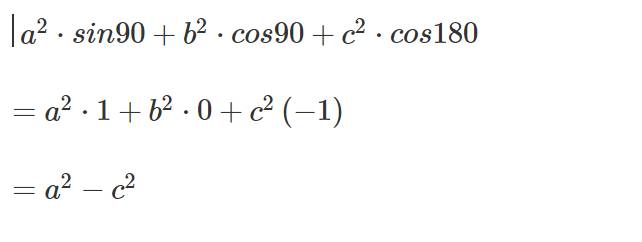Hãy nhập câu hỏi của bạn vào đây, nếu là tài khoản VIP, bạn sẽ được ưu tiên trả lời.

= cos \(_{^{ }\beta}\).cos\(\beta\).(-cot\(\beta\)) vậy dấu của A là dấu trừ

a:\(a\cdot sin0+b\cdot cos0+c\cdot sin90\)
\(=a\cdot0+b\cdot1+c\cdot1\)
=b+c
b: \(a\cdot cos90+b\cdot sin90+c\cdot sin180\)
\(=a\cdot0+b\cdot1+c\cdot0\)
=b
c: \(a^2\cdot sin90+b^2\cdot cos90+c^2\cdot cos180\)
\(=a^2\cdot1+b^2\cdot0+c^2\left(-1\right)\)
\(=a^2-c^2\)

0 < α < 90 => cosα > 0
Ta có: sin2α + cos2α = 1 => cosα = \(\frac{3}{5}\)
90 < β < 180 => cosβ < 0
Ta có: sin2β + cos2β = 1 => cosβ = \(\frac{-15}{17}\)
a = cos(α + β) = cosαcosβ - sinαsinβ = \(\frac{-77}{85}\)

Do \(90< a< 180\Rightarrow cosa< 0\Rightarrow tana< 0\Rightarrow\) đề bài sai do tana không thể bằng 3
Nhưng kệ cứ tính thì:
Chia cả tử và mẫu của A cho \(cos^3a\) và lưu ý \(\frac{1}{cos^2a}=1+tan^2a\)
\(A=\frac{tana.\frac{1}{cos^2a}+tan^2a+1}{tan^3a-tana-1}=\frac{tana\left(1+tan^2a\right)+tan^2a+1}{tan^3a-tana-1}\)
Tới đây thay số vào và bấm máy là xong

b) \(\sin x+\cos x=\dfrac{3}{2}\)
\(\left(\sin x+\cos x\right)^2=\dfrac{1}{4}\)
\(\sin^2x+\cos^2x+2\sin x\cos x=\dfrac{1}{4}\)
\(2\sin x\cos x=-\dfrac{3}{4}=\sin2x\)

a: 
b: \(B=3-sin^290^0+2\cdot cos^260^0-3\cdot tan^245^0\)
\(=3-1+2\cdot\left(\dfrac{1}{2}\right)^2-3\cdot1^2\)
\(=2-3+2\cdot\dfrac{1}{4}=-1+\dfrac{1}{2}=-\dfrac{1}{2}\)
c: \(C=sin^245^0-2\cdot sin^250^0+3\cdot cos^245^0-2\cdot sin^240^0+4\cdot tan55\cdot tan35\)
\(=\left(\dfrac{\sqrt{2}}{2}\right)^2+3\cdot\left(\dfrac{\sqrt{2}}{2}\right)^2-2\cdot\left(sin^250^0+sin^240^0\right)+4\)
\(=\dfrac{1}{2}+3\cdot\dfrac{1}{2}-2+4\)
\(=2-2+4=4\)

\(sina\sqrt{1+\frac{sin^2a}{cos^2a}}=sina\sqrt{\frac{cos^2a+sin^2a}{cos^2a}}=\frac{sina}{\left|cosa\right|}=\pm tana\)
\(\frac{1-cos^2x}{1-sin^2x}+tanx.cotx=\frac{sin^2x}{cos^2x}+\frac{sinx}{cosx}.\frac{cosx}{sinx}=tan^2x+1=\frac{1}{cos^2x}\)
\(\frac{1-4sin^2xcos^2x}{\left(sinx+cosx\right)^2}=\frac{\left(1-2sinx.cosx\right)\left(1+2sinx.cosx\right)}{sin^2x+cos^2x+2sinx.cosx}=\frac{\left(1-sin2x\right)\left(1+2sinx.cosx\right)}{1+2sinx.cosx}=1-2sinx\)
\(sin\left(90-x\right)+cos\left(180-x\right)+sin^2x\left(1+tan^2x\right)-tan^2x\)
\(=cosx-cosx+sin^2x.\frac{1}{cos^2x}-tan^2x=tan^2x-tan^2x=0\)

a: Sửa đề: sin x=4/5
cosx=-3/5; tan x=-4/3; cot x=-3/4
b: 270 độ<x<360 độ
=>cosx>0
=>cosx=1/2
tan x=căn 3; cot x=1/căn 3

a)
Đặt \(A = \left( {2\sin {{30}^o} + \cos {{135}^o} - 3\tan {{150}^o}} \right).\left( {\cos {{180}^o} - \cot {{60}^o}} \right)\)
Ta có: \(\left\{ \begin{array}{l}\cos {135^o} = - \cos {45^o};\cos {180^o} = - \cos {0^o}\\\tan {150^o} = - \tan {30^o}\end{array} \right.\)
\( \Rightarrow A = \left( {2\sin {{30}^o} - \cos {{45}^o} + 3\tan {{30}^o}} \right).\left( { - \cos {0^o} - \cot {{60}^o}} \right)\)
Sử dụng bảng giá trị lượng giác của một số góc đặc biệt, ta có:
\(\left\{ \begin{array}{l}\sin {30^o} = \frac{1}{2};\tan {30^o} = \frac{{\sqrt 3 }}{3}\\\cos {45^o} = \frac{{\sqrt 2 }}{2};\cos {0^o} = 1;\cot {60^o} = \frac{{\sqrt 3 }}{3}\end{array} \right.\)
\( \Rightarrow A = \left( {2.\frac{1}{2} - \frac{{\sqrt 2 }}{2} + 3.\frac{{\sqrt 3 }}{3}} \right).\left( { - 1 - \frac{{\sqrt 3 }}{3}} \right)\)
\(\begin{array}{l} \Leftrightarrow A = - \left( {1 - \frac{{\sqrt 2 }}{2} + \sqrt 3 } \right).\left( {1 + \frac{{\sqrt 3 }}{3}} \right)\\ \Leftrightarrow A = - \frac{{2 - \sqrt 2 + 2\sqrt 3 }}{2}.\frac{{3 + \sqrt 3 }}{3}\\ \Leftrightarrow A = - \frac{{\left( {2 - \sqrt 2 + 2\sqrt 3 } \right)\left( {3 + \sqrt 3 } \right)}}{6}\\ \Leftrightarrow A = - \frac{{6 + 2\sqrt 3 - 3\sqrt 2 - \sqrt 6 + 6\sqrt 3 + 6}}{6}\\ \Leftrightarrow A = - \frac{{12 + 8\sqrt 3 - 3\sqrt 2 - \sqrt 6 }}{6}.\end{array}\)
b)
Đặt \(B = {\sin ^2}{90^o} + {\cos ^2}{120^o} + {\cos ^2}{0^o} - {\tan ^2}60 + {\cot ^2}{135^o}\)
Ta có: \(\left\{ \begin{array}{l}\cos {120^o} = - \cos {60^o}\\\cot {135^o} = - \cot {45^o}\end{array} \right. \Rightarrow \left\{ \begin{array}{l}{\cos ^2}{120^o} = {\cos ^2}{60^o}\\{\cot ^2}{135^o} = {\cot ^2}{45^o}\end{array} \right.\)
\( \Rightarrow B = {\sin ^2}{90^o} + {\cos ^2}{60^o} + {\cos ^2}{0^o} - {\tan ^2}60 + {\cot ^2}{45^o}\)
Sử dụng bảng giá trị lượng giác của một số góc đặc biệt, ta có:
\(\left\{ \begin{array}{l}\cos {0^o} = 1;\;\;\cot {45^o} = 1;\;\;\cos {60^o} = \frac{1}{2}\\\tan {60^o} = \sqrt 3 ;\;\;\sin {90^o} = 1\end{array} \right.\)
\( \Rightarrow B = {1^2} + {\left( {\frac{1}{2}} \right)^2} + {1^2} - {\left( {\sqrt 3 } \right)^2} + {1^2}\)
\( \Leftrightarrow B = 1 + \frac{1}{4} + 1 - 3 + 1 = \frac{1}{4}.\)
c
Đặt \(C = \cos {60^o}.\sin {30^o} + {\cos ^2}{30^o}\)
Sử dụng bảng giá trị lượng giác của một số góc đặc biệt, ta có:
\(\sin {30^o} = \frac{1}{2};\;\;\cos {30^o} = \frac{{\sqrt 3 }}{2};\;\cos {60^o} = \frac{1}{2}\;\)
\( \Rightarrow C = \frac{1}{2}.\frac{1}{2} + {\left( {\;\frac{{\sqrt 3 }}{2}} \right)^2} = \frac{1}{4} + \frac{3}{4} = 1.\)

A=cos(90-x) - 2sin(180-x) + sinx
= sinx - 2sinx + sinx = 0